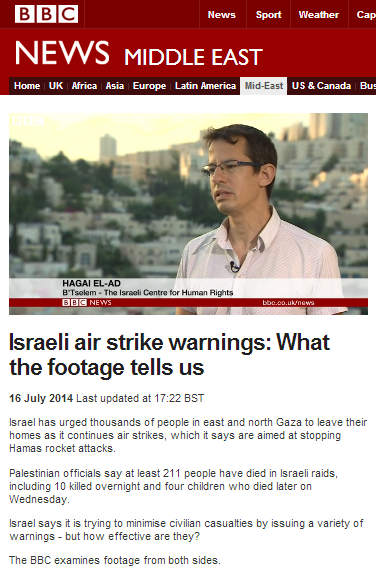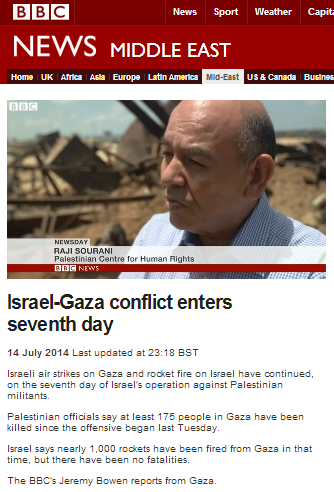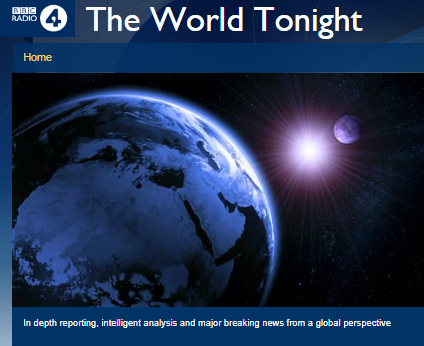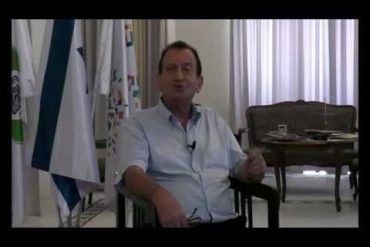Back in May of last year we presented an overview of the NGOs quoted and promoted in BBC coverage of Israel over a six month period. In this post we will take a similar look at the organisations featured in BBC coverage during 2014.
In some instances an interviewee or contributor to BBC content was presented to audiences by name and with the title of his or her organization, but more often than not the political agenda of that organization and the interviewee’s resulting “standpoint” were not adequately clarified – as demanded by BBC editorial guidelines on impartiality. The same practice was evident when quotes were used from organisations’ press releases without being attributed to a specific person. Examples from 2014 include:
- Aviv Tatarsky of Ir Amim
- Human Appeal International
- Mahmoud Abu Rahma of Al Mezan
- Rina Andolini of the ISM
- Raji Sourani of the PCHR – see here, here, here and here
- Oxfam – see here, here and here
- Peace Now – see here and here
- B’Tselem – see here, here, here, here, here, here and here
In other cases, interviewees or contributors were presented by name only and – again in breach of editorial guidelines – BBC audiences were not informed of their affiliations with campaigning organisations or of the fact that their contribution should be assessed within the context of a particular political agenda. Examples from 2014 include:
- Daniel Seidemann of Terrestrial Jerusalem – see here, here and here
- Rabbi Laura Janner-Klausner of British Friends of Rabbis for Human Rights
- Amir Heshin of the Jerusalem Conflict Academic Centre
- Tayseer Maray of Golan for Development
- Rafeef Ziadeh of War on Want
- Joe Catron of the ISM
- Adie Mormech of the ISM and ‘Free Gaza’
- Amena Saleem of the PSC
- Issa Amro of ‘Youth Against Settlements’ and ISM – see here and here
In additional cases, the BBC took it upon itself to directly amplify an NGO’s agenda via promotion of its published material or particular campaigns. Examples from the past year include:
- Amnesty International – see here, here, here and here

- Human Rights Watch – see here, here and here
- Tent of Nations
2014 also saw extensive BBC coverage of anti-Israel demonstrations in the UK organized by groups such as the Palestine Solidarity Campaign and the Stop the War Coalition but no effort was made to inform audiences of the real agendas and links of those groups and antisemitic material appearing at those demonstrations was either ignored or whitewashed.
So which NGOs were the most quoted and promoted in BBC Israel-related content in 2014? Among the local NGOs contributing to BBC produced material either in the form of quotes or by means of inadequately identified interviewees, the organization appearing most was B’Tselem, followed by the PCHR. This does not however include the indirect amplification of the agendas of those two organisations, along with Al Mezan, by means of the BBC’s repeated promotion of the Gaza Strip casualty figures for which they were primary sources.
Among the foreign NGOs promoted, quoted and amplified in BBC Israel-related content during 2014, the Palestine Solidarity Campaign received the most exposure – mainly via coverage of its summer anti-Israel demonstrations in the UK and its involvement in the campaign against SodaStream – followed by Amnesty International and Human Rights Watch.
In July of this year NGO Monitor publicized a lawfare campaign against Israel instigated by a collection of NGOs. Among them were Human Rights Watch, Amnesty International, Al Mezan and the PCHR – all of which were promoted prominently by the BBC during 2014 but, in breach of BBC editorial guidelines, with no information provided to audiences concerning their political agenda in general and their involvement in that lawfare campaign in particular.
As readers may recall, in his recent article about media coverage of Israel, Matti Friedman noted the relationship between journalists and NGOs.
“This confusion is very much present in Israel and the Palestinian territories, where foreign activists are a notable feature of the landscape, and where international NGOs and numerous arms of the United Nations are among the most powerful players, wielding billions of dollars and employing many thousands of foreign and local employees. […]
In my time in the press corps, I learned that our relationship with these groups was not journalistic. My colleagues and I did not, that is, seek to analyze or criticize them. For many foreign journalists, these were not targets but sources and friends—fellow members, in a sense, of an informal alliance. This alliance consists of activists and international staffers from the UN and the NGOs; the Western diplomatic corps, particularly in East Jerusalem; and foreign reporters. (There is also a local component, consisting of a small number of Israeli human-rights activists who are themselves largely funded by European governments, and Palestinian staffers from the Palestinian Authority, the NGOs, and the UN.)”
Not only did the BBC continue to provide many examples of the phenomenon described by Friedman throughout 2014 but it also compromised its supposed commitment to impartial journalism by supplying free publicity and amplification for NGOs engaged in political warfare against Israel whilst failing to inform audiences of the agendas of those groups. Audiences need to be informed of the background to organisations providing quotes and material promoted by the BBC which shapes audience perception of issues. The BBC is consistent in its avoidance of provision of that information despite the existence of editorial guidelines requiring it to do so.




